Avoid your inquiry is delay response, please enter your WhatsApp/WeChat/Skype along with the message, so we can contact you at the very first time
We will reply you within 24 hours. If for urgent case, please add WhatsApp: +8617888313102, or WeChat: +86 17864107808. Or call +86 17864107808 directly.
*We respect your confidentiality and all information are protected. We will only use your information to respond to your inquiry and will never send unsolicited emails or promotional messages.
Struggling to print vibrant, durable designs on challenging materials? Traditional printing methods often fall short, limiting your product offerings and creative potential. You need a solution that delivers exceptional quality across a wide range of substrates, opening up new markets and impressing clients.
A UV printer unlocks a universe of creative and commercial opportunities by allowing you to print directly onto an incredibly diverse array of materials. From personalized phone cases and intricate packaging prototypes to stunning home décor items like ceramic tile and custom signage on acrylic or wood, the possibilities are vast. This digital printing technology uses UV light to instantly cure specialized ink, creating durable, high-resolution prints on both flat and sometimes even cylindrical objects.
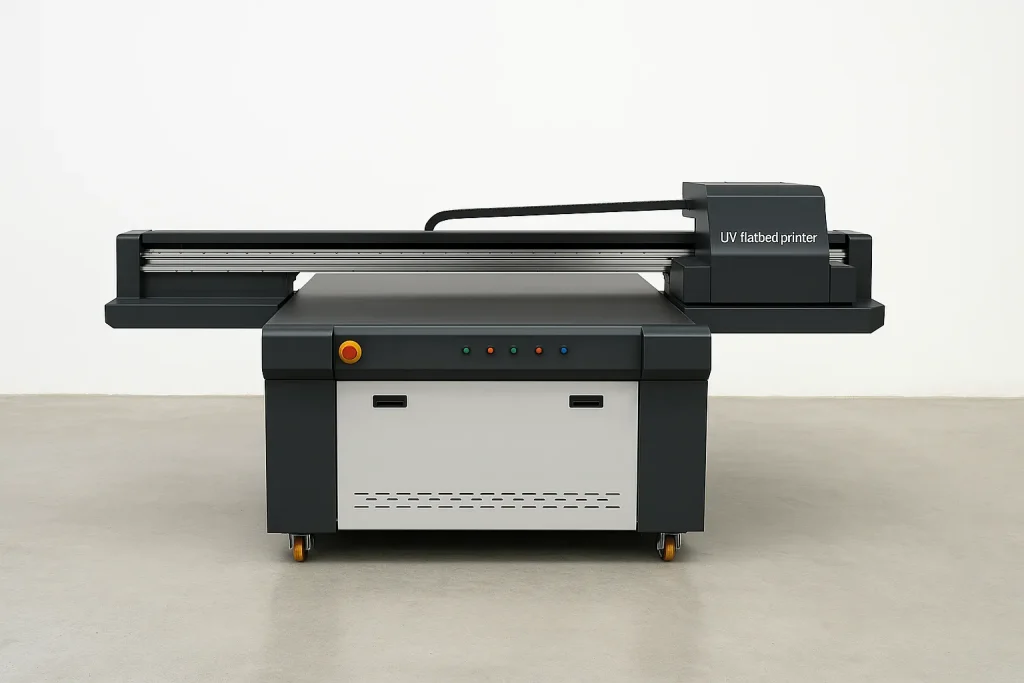
As a leading UV Flatbed Printer Manufacturing Plant, we’ve witnessed firsthand the transformative power of this technology. We understand the critical importance of printing accuracy, material versatility, and reliable performance because we build the machines that drive success for businesses like yours. Whether you’re an Advertising & Logo Maker needing crisp branding, a Packaging printing factory demanding precise prototypes, an Industrial manufacturer requiring durable markings, or a Home Decoration Company seeking unique finishes, the right UV flatbed printer is a game-changer. Let’s dive into what makes UV printing so special and explore the incredible range of items you can create.
UV printing is a form of digital printing that utilizes ultra-violet (UV) lights to cure or dry specially formulated ink almost instantaneously as it’s printed on a surface. Unlike traditional printing methods where inks need time to dry or are absorbed into the material, UV ink sits on top of the substrate and hardens immediately when exposed to UV light. This process happens line by line as the print head moves across the printing medium.
The magic lies in the chemistry of the UV ink and the UV curing process. The ink contains photoinitiators that react when exposed to specific wavelengths of UV light. This reaction causes the ink to transform from a liquid to a solid state in a fraction of a second. This rapid curing prevents the ink from spreading or bleeding, resulting in incredibly sharp details and vibrant colors, even on non-porous materials.
Because the ink doesn’t get absorbed, UV printing allows you to print directly onto a vast range of materials, including those that are typically difficult or impossible for conventional printers. Think glass, metal, acrylic, wood, plastics, ceramic tile, and much more. This versatility is a key reason why UV printers, particularly UV flatbed printers, have become indispensable tools in various industries.
For businesses prioritizing versatility and the ability to print on rigid, thick, or unconventionally shaped items, a UV flatbed printer is often the superior choice. Unlike roll-to-roll printers designed primarily for flexible media, a flatbed printer features a stationary flat surface where the substrate is placed. The print head assembly then moves across the material (along X and Y axes) and sometimes vertically (Z-axis) to accommodate different thicknesses.
This design offers significant advantages. You gain the ability to print directly onto materials like thick acrylic sheets, pre-fabricated panels, tile, wooden planks, phone cases, and even small promotional objects. The adjustable printing height on many UV flatbed models allows for direct printing on items up to several inches thick. This direct-to-object capability eliminates intermediate steps often required in other processes, saving time and potential alignment issues.
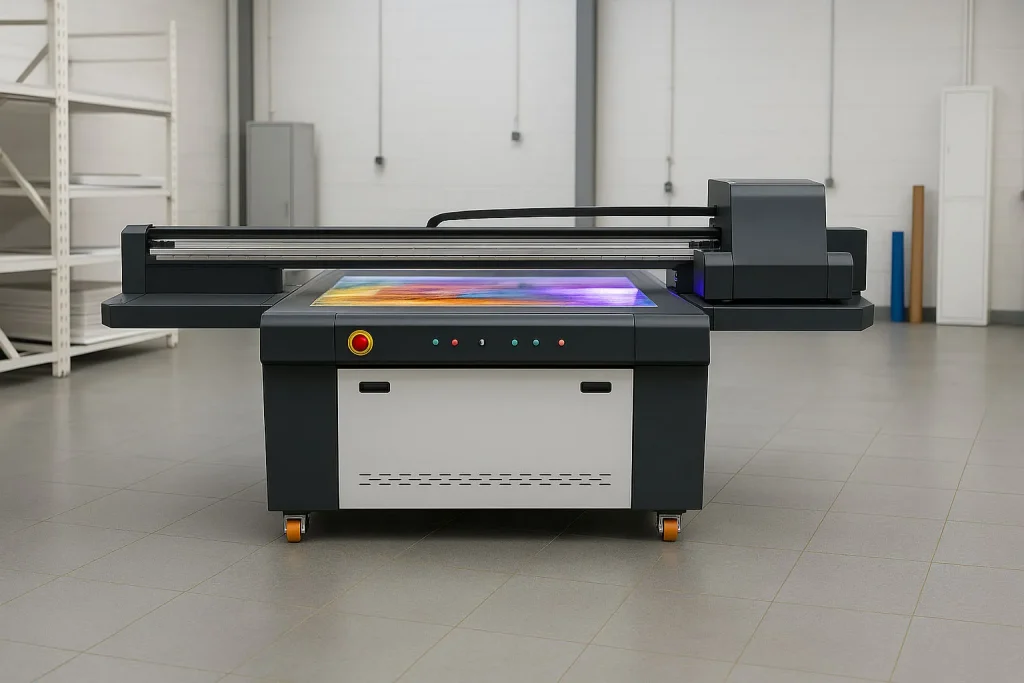
Furthermore, as manufacturers, we design our UV flatbed printers with printing accuracy and robustness in mind. Precise vacuum systems hold materials securely in place during printing, ensuring sharp registration and edge-to-edge coverage. The sturdy construction is built for industrial environments, providing reliability for Advertising & Logo Makers, Packaging factories, and Industrial manufacturing companies who depend on consistent output. The power of UV combined with a flatbed design offers unparalleled flexibility.
One of the most compelling features of a UV printer is its incredible media compatibility. The instant UV curing process means the ink adheres to a vast spectrum of surfaces without needing special coatings (though primers can sometimes enhance adhesion on extremely challenging materials). This opens doors for immense creativity and product diversification.
Here’s a glimpse of the materials a UV printer can work with:
This versatility is a massive advantage compared to traditional printing methods like screen printing or pad printing, which often require specific setups for different material types. With a UV printer, switching between printing on acrylic signage and wooden coasters can be as simple as changing the substrate on the flatbed.
The wide material compatibility directly translates into an almost limitless range of applications. UV printing empowers businesses to create unique, high-value products across numerous sectors. Let’s explore some popular ways businesses use UV printing to make compelling items:
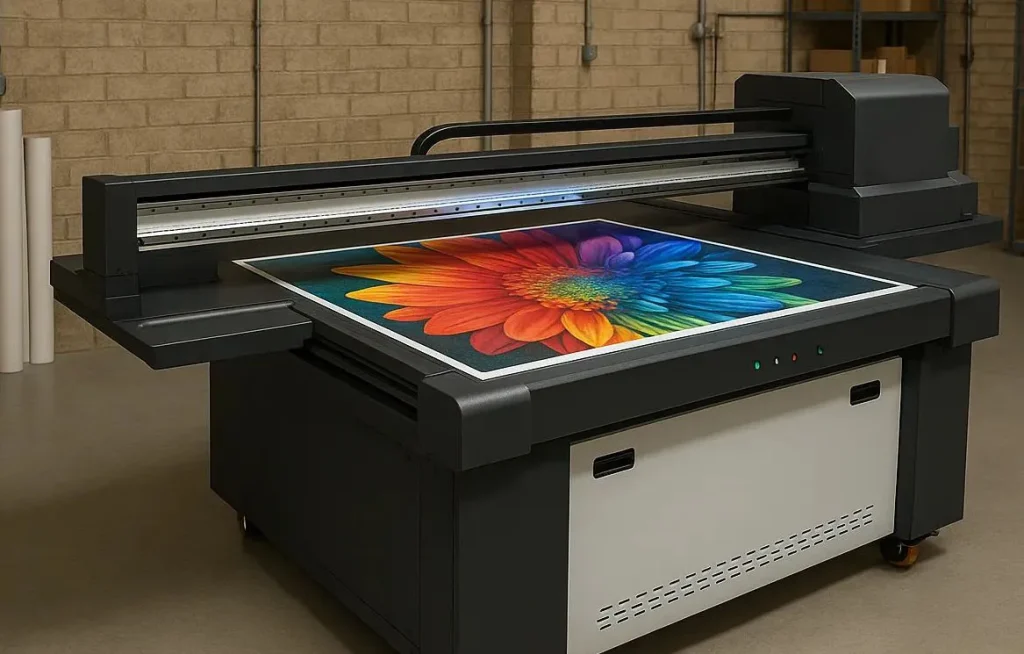
The list goes on – architectural elements, trade show graphics, personalized stationery, membrane switches… if you can fit it on the flatbed, chances are your UV printer can print on it.
While the core strength of a UV flatbed printer lies in printing on flat, rigid substrates, the question often arises: can it handle curves? Standard flatbed printers are primarily designed for flat surfaces. The distance between the print head and the substrate needs to be precisely controlled for optimal print quality. Significant curves can cause blurring or inconsistencies.
However, the printing industry continuously innovates. There are several approaches:
As manufacturers, we offer various configurations, including models compatible with rotary attachments, to ensure our clients have the UV printing solution that best fits their product mix. If printing on cylindrical items is a primary need, discussing rotary options or specialized machines is crucial.
In any printing operation, speed and quality are often seen as a trade-off. UV printing is no exception, but modern UV printers offer remarkable flexibility in balancing these factors. Several elements influence this balance:
As manufacturers, we design our UV printers with sophisticated control systems allowing users to easily select different print modes to optimize for speed, quality, or a balance between the two, depending on the specific job requirements. We help clients choose the best UV printer configuration (e.g., number of print heads) based on their anticipated workload and quality demands.
Compared to traditional printing methods like screen printing, pad printing, or solvent-based digital printing, UV printing technology offers a compelling set of advantages that directly address the needs of our target customers:
| Feature | UV Printing | Traditional Methods (e.g., Screen Printing) |
|---|---|---|
| Material Versatility | Prints on wood, glass, metal, plastic, acrylic, ceramic, etc. | Often limited to specific material types per setup. |
| Setup Time | Minimal; direct digital workflow. | Requires screens, plates, longer setup. |
| Turnaround Time | Fast; instant cure, no drying time needed. | Slower; requires drying/curing time. |
| Durability | Excellent scratch, fade, and water resistance. | Varies greatly by ink and process. |
| Environmental | Low/Zero VOCs (Volatile Organic Compounds). | Often involves solvents and VOCs. |
| Detail & Color | High resolution, vibrant colors, gradients. | Can be excellent, but gradients challenging. |
| Variable Data | Easy to print personalized items/batches. | Difficult or impossible for variable data. |
| Short Runs | Economical for prototypes and small quantities. | Can be expensive for short runs. |
Advantages of UV printing summarised:
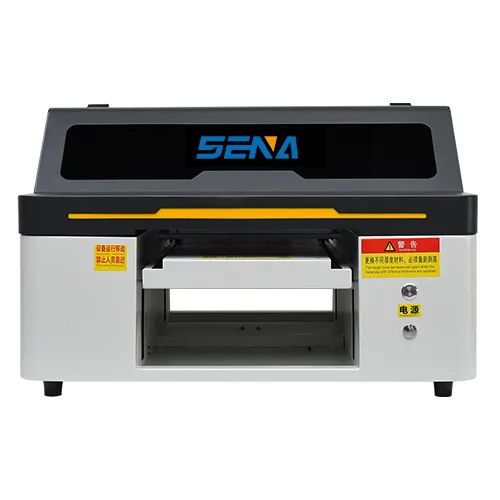
For businesses like Advertising & Logo Makers needing quick turnarounds on diverse promo items, or Packaging factories requiring rapid prototyping, these advantages are transformative. UV printing makes complex jobs simpler and opens up new revenue streams.
The term “UV printer” encompasses several machine types, each suited for different applications. Understanding these distinctions is key to selecting the right equipment:
As a UV Flatbed Printer Manufacturing plant, our expertise lies heavily in flatbed and hybrid printer technologies. We guide clients like Printing service providers and Brands to determine if a pure flatbed, a hybrid, or a flatbed with a rotary option best suits their current and future printing needs. We also see UV Printing OEM Factory clients who integrate our core flatbed technology into their specialized systems.
Evaluating the printing cost of UV printing requires looking beyond just the ink price. Several factors contribute to the overall economics:
While the initial investment and ink costs might seem high, the efficiency, versatility, reduced labor for setup, and ability to command premium prices for custom, high-quality products often make UV printing highly profitable. For many applications, especially short-to-medium runs and personalized items, UV printing offers a superior return on investment. We work with clients to analyze their specific application costs and demonstrate the long-term value.
Choosing the right UV printer is a critical decision. As manufacturers, we advise clients to consider these key factors:
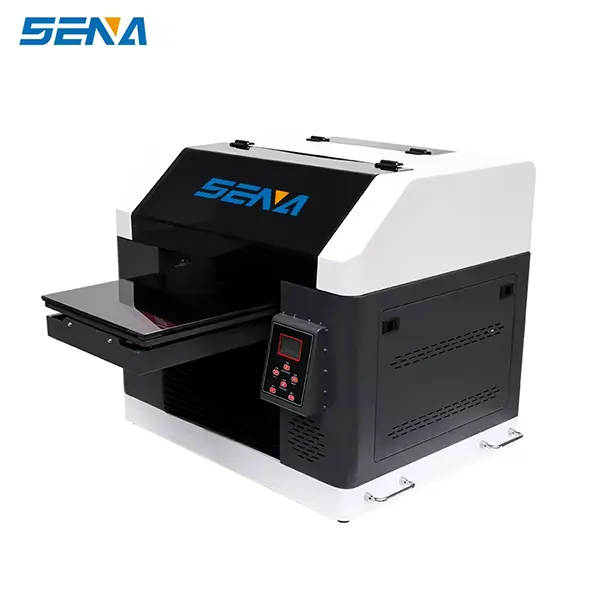
We encourage potential buyers to discuss these points in detail with us. We can provide demonstrations, print samples on your specific materials, and help you configure the best UV printer – perhaps a robust UV flatbed printer or a versatile hybrid printer – tailored precisely to your printing business goals. We aim to provide not just a machine, but a complete uv printing solution.
Investing in a UV flatbed printer is significant. The machine’s ongoing performance and your ability to capitalize on its capabilities heavily depend on the support you receive after the purchase. This is where partnering directly with a reputable UV Flatbed Printer Manufacturing plant like us makes a tangible difference.
Here’s why robust after-sales service and warranty are critical priorities for our target customers:
Choosing a partner focused on long-term relationships and reliable support protects your investment and ensures you can consistently deliver the high-quality results your clients expect. Our commitment extends beyond the sale; we aim to be a resource for your printing and uv success. We understand that for a Gift customization company or a UV Printing OEM Factory, reliable operation is non-negotiable.
Is UV printed ink durable and scratch-resistant?
Yes, UV ink cures to a hard, durable finish almost instantly upon exposure to UV light. This makes it highly resistant to scratches, abrasion, fading (due to UV inhibitors in the ink), and moisture compared to traditional printing methods. Adhesion can vary slightly depending on the substrate, and sometimes a primer is recommended for optimal results on materials like glass or certain metals.
What is the learning curve like for operating a UV flatbed printer?
Modern UV printers come with sophisticated RIP (Raster Image Processing) software that simplifies workflow. While basic operation can be learned relatively quickly with proper training (which we provide), mastering advanced techniques, color management, and optimizing settings for different materials requires some experience. Our training and support are designed to get your operators proficient efficiently.
Can you achieve textured effects with UV printing?
Absolutely! One exciting capability of UV printing is the ability to build up layers of ink, including clear ink (varnish). By printing multiple passes of clear ink in specific areas, you can create raised textures, simulated embossing, or Braille effects, adding significant value and tactile appeal to prints. This is a great feature for Home Decoration Company clients or those making high-end packaging prototypes.
How does UV printing compare to UV DTF printing?
UV printing (specifically direct-to-object/substrate) prints directly onto the final item. UV DTF printing is a newer, multi-step process where the design is first printed onto a special film (Film A), laminated with a second film (Film B), and then the resulting adhesive-backed design is transferred onto the object like a highly durable sticker. UV DTF excels at applying designs to irregular shapes or materials where direct UV print might be difficult, but it involves more steps and consumables (dtf printer, films, adhesive). Direct UV printing is generally faster and more integrated for compatible objects.
What maintenance does a UV printer require?
Regular maintenance is crucial for optimal performance and longevity. Daily tasks typically include cleaning the print head surface and capping station. Weekly or periodic maintenance might involve cleaning filters, checking ink lines, and lubricating certain parts. UV lamp replacement is also required after a certain number of operating hours (LED lamps last much longer than older mercury lamps). We provide detailed maintenance schedules and training.
How environmentally friendly is UV printing really?
UV printing is considered significantly more environmentally friendly than solvent-based printing methods. UV inks contain very low or zero Volatile Organic Compounds (VOCs), which are harmful pollutants. The instant UV curing process also consumes less energy overall compared to processes requiring large heat dryers. While not entirely impact-free (requires electricity, consumables), it’s a greener choice within the printing industry.
Leveraging the power of UV printing, especially with a versatile UV flatbed printer, can revolutionize your product offerings and production efficiency. Remember these key points:
As a dedicated UV Flatbed Printer Manufacturing plant, we are passionate about helping businesses like yours harness the full potential of this transformative printing technology. We understand the nuances of printing accuracy, material handling, and workflow optimization.
Ready to explore how a UV flatbed printer can elevate your business? Contact us today to discuss your specific printing needs, request print samples, or schedule a demonstration. Let’s make UV work for you!